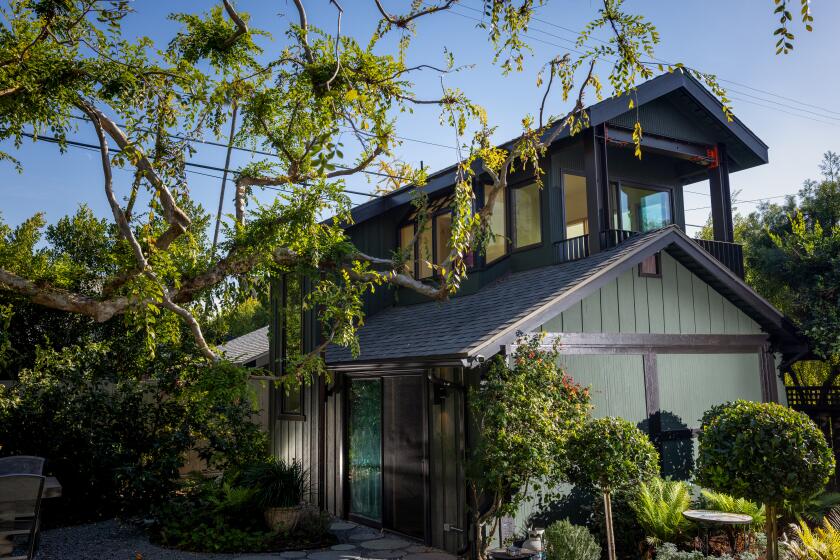Retroactive OK sought for Malibu work
The coastal protection agency that secured a public beach path last year through entertainment magnate David Geffen’s Malibu compound now is being asked to approve several projects that previously had been constructed there without permits.
Officials said Geffen built a 42-foot-long deck extension, a private stairway to the beach, a large storage shed, fencing, a gate and a concrete walkway without California Coastal Commission permission. And they said all but the deck were constructed on state-held easements.
But Geffen would not have to remove any structures, except the stairway, according to a staff proposal this month on finalizing settlement of the lawsuits that he and the commission filed against each other a few years ago.
Instead, the billionaire would make a 42-foot swath of sand accessible to the public, meaning all 275 feet of Carbon Beach in front of his Cape Cod-style complex could be used for sunbathing, strolling and other recreation.
State officials said it was an appropriate trade-off because the beachfront gate and erosion from the illegally paved pathway make public access more difficult.
“Offering 42 feet of beach is a good way to mitigate the overall public access impacts of his violations,” said Linda Locklin, the commission’s coastal access program manager.
The commission was scheduled to consider the plan at a meeting here today, but the vote was postponed at the request of Geffen attorney Steve Amerikaner, who wanted time to finalize the details.
Disputing the commission, Amerikaner said the 42-foot-by-5-foot deck extension had a permit but part was inadvertently built a few feet too close to the water because of imprecise drawings.
As for other construction, he said Geffen generally “thought the work was so minor that it would not be an issue.”
Geffen is applying for Coastal Commission permits for the structures under a settlement reached early this year. It followed an agreement in April 2005 to open his wooden gates, which had prevented the public from walking from Pacific Coast Highway to the beach.
With certain conditions, the commission staff has recommended that the panel grant Geffen “after-the-fact” approvals for most of the construction while he would provide the additional beachfront easement and $125,000 to pay for opening the gates at sunrise and closing them at sunset each day.
If the commission grants permits and Geffen accepts, he also would pay $310,000 in state legal expenses and other costs.
Geffen offered to dedicate a public pathway to the beach in the mid-1980s in exchange for the commission’s permission for construction projects.
But the path remained closed for two decades because the state took no action to open it; then it was tied up in court for nearly three years. Geffen contended that Access for All, a Topanga nonprofit group that accepted responsibility for the pathway, lacked the ability to care for it.
State officials said people who use the pathway now are legally required to walk below the mean high tide line, where the public beach begins, then skirt a 42-foot stretch of sand with no public easement.
“We want to fix this issue by making sure the entire beach in front of his compound has a public access way,” Locklin said.
The commission staff found that Geffen built a stairway that extends four feet onto a public beach easement. “We hope to persuade the commission that a minor incursion is not worth a big fight,” Amerikaner said.
A staff report said Geffen also had no permit for a 30 1/2 -by9-foot shed, nor for a 56-foot-long concrete slab covering the public walkway, nor for a gate at one end of the walkway.
The report said the shed was built on an easement held by Caltrans, but Caltrans officials say they have had no access problems.
Geffen did not think the shed, built 15 to 20 years ago, was a problem, Amerikaner said, because the commission staff did not raise the issue during visits to the property to process earlier permit applications.
The commission staff said runoff from the slab has caused steep erosion, so they want Geffen to provide a portable ramp to help the public reach the beach when sand washes away, causing a drop of several feet.
Amerikaner said Geffen built the slab during the litigation to make for safer walking. The attorney said he wants to investigate the availability and suitability of ramps before agreeing to provide one.
*
More to Read
Start your day right
Sign up for Essential California for news, features and recommendations from the L.A. Times and beyond in your inbox six days a week.
You may occasionally receive promotional content from the Los Angeles Times.






